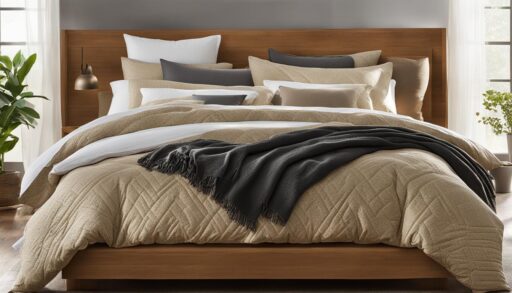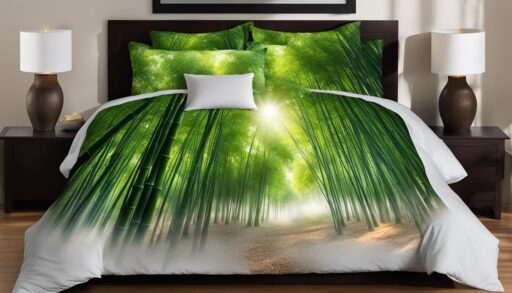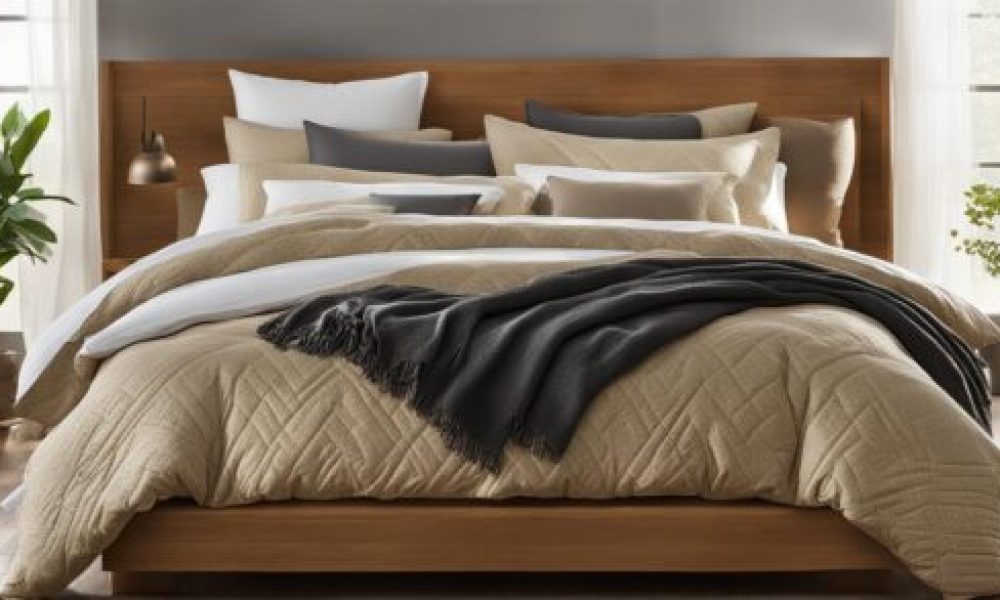Eco-Friendly Bedding: 7 Best Materials for Healthier Sleep
Eco-friendly bedding is one of the simplest ways to improve your sleep quality while reducing your environmental footprint. By choosing natural, sustainable, and toxin-free bedding, you create a healthier sleep space and help protect the planet at the same time.
Key Takeaways
- Eco-friendly bedding promotes healthier, chemical-free sleep.
- Top materials include organic cotton, bamboo, hemp, Tencel, latex, and wool.
- These sustainable choices are biodegradable, durable, and allergy-friendly.
- Pairing bedding with an eco-conscious mattress enhances sustainability.
- Switching supports both personal well-being and a greener planet.
Why Sustainable Bedding is the Best Choice
Conventional bedding often contains synthetic chemicals and dyes that can irritate skin and harm the environment. Green bedding alternatives use renewable, toxin-free, and biodegradable materials, offering comfort and sustainability in one package.
For example, switching to organic cotton sheets can reduce exposure to pesticides while giving you breathable, long-lasting comfort.

Exploring different sustainable bedding materials like cotton, hemp, and bamboo.
Top Materials for Sustainable Bedding
1. Organic Cotton
Organic cotton is grown without pesticides, conserving water and improving soil health. It’s breathable, durable, and soft on sensitive skin.
- Free from harmful chemicals.
- Supports biodiversity and soil fertility.
- Durable with proper care.
Learn more in this guide to green bedding options.
2. Bamboo Bedding
Bamboo grows quickly with little water and no pesticides. Sheets made from bamboo are silky soft, cooling, and naturally hypoallergenic—perfect for hot sleepers.
- Moisture-wicking and temperature-regulating.
- Biodegradable and compostable.
- Gentle on sensitive skin.

Bamboo bedding is soft, breathable, and perfect for warm sleepers.
See product recommendations in the People Best Bamboo Sheets review.
3. Hemp Bedding
Hemp is one of the most sustainable crops. It requires minimal water, grows without chemicals, and creates bedding that lasts for years.
- Resists mold and mildew naturally.
- Strong and long-lasting fabric.
- Reduces need for pesticides.
4. Tencel
Tencel comes from sustainably managed wood pulp. The closed-loop production process uses less water than cotton, and the fabric is soft, breathable, and biodegradable.
- Gentle on skin, hypoallergenic.
- Eco-friendly manufacturing process.
- Soft and luxurious feel.
5. Natural Latex
Harvested from rubber trees, natural latex is renewable and toxin-free. It’s often used in eco-conscious mattresses for its supportive and long-lasting qualities.
- Promotes spinal alignment.
- Durable and biodegradable.
- Free from harmful chemicals.
6. Wool Bedding
Wool is naturally temperature-regulating, hypoallergenic, and renewable. It keeps you warm in winter and cool in summer—ideal for year-round comfort.
- Resists dust mites, mold, and mildew.
- Recyclable and biodegradable.
- Excellent insulation properties.

Sustainable materials like wool and cotton offer durability and comfort.
Choosing a Sustainable Mattress
Pair your bedding with an eco-conscious mattress. These mattresses use natural latex, wool, and organic cotton, avoiding synthetic foams and chemical fire retardants.
Learn more about healthy bedding accessories in this guide to mattress add-ons.

Eco-conscious mattress and bedding options create a sustainable sleep environment.
Benefits of Switching to Greener Bedding
- Healthier Sleep Environment: Reduces allergens and toxins.
- Sustainability: Renewable, biodegradable materials conserve resources.
- Durability: Long-lasting bedding means fewer replacements.
Switching to planet-friendly bedding is a simple but powerful step toward better rest and a greener lifestyle.
FAQ
Is eco-friendly bedding more expensive?
Yes, but it lasts longer and saves money over time by reducing replacements.
Which eco-friendly bedding is best for hot sleepers?
Bamboo and Tencel are excellent choices because they wick away moisture and keep you cool.
How do I know if bedding is truly eco-friendly?
Look for certifications like CertiPUR-US and GREENGUARD Gold to ensure sustainability and safety.
Can eco-conscious bedding help with allergies?
Yes, materials like organic cotton, hemp, and wool are naturally hypoallergenic.
Conclusion
Making the switch to eco-friendly bedding improves your sleep quality, protects your health, and supports the environment. At Cozy Bed Quarters, we believe that small choices—like the sheets you sleep on—can make a big difference. Rest easy knowing your bed is both comfortable and sustainable.
Related Reading
- Eco-Friendly Bedding Choices
- Advantages of Eco-Friendly Bedding
- Buy Bedding & Donate Locally
- Architectural Digest: Duvet vs. Comforter
- Wired Best Organic Sheets 2025
- New York Post Mattress Buying Guide























